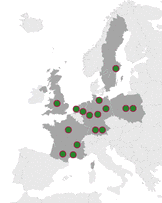Background
European research project dsd-LIFE improves clinical care in individuals with different types of hormonal disorders of the gonads or adrenals.
Improving Quality of Life for Patients with Disorders of Sex Development
dsd-Life, an international, EU-funded research project aims to improve clinical care in individuals with different types of hormonal disorders of the gonads or adrenals. Since the last 2 decades the genetic causes and the pathogenesis have been identified in many patients. These hereditary conditions are summarized under the medical umbrella term disorders of sex development (DSD) including e.g. “XY Disorders of Androgen Synthesis or Action”, “XY and XX gonadal dysgenesis”, “Congenital Adrenal Hyperplasia”, “Turner Syndrome” and “Klinefelter Syndrome”. The term 'DSD' is introduced 2005 at the Chicago Consensus Conference to replace confusing and stigmatizing terms such as 'intersex' or 'hermaphroditism' for patients with XY DSD.
Comprehensive clinical care
Multidisciplinary clinical care as decision on the sex of rearing, genital surgery, hormone therapies and psychological support has a life-long impact on the affected persons. Previous clinical outcome studies of DSD were hampered by small patient numbers, different outcome measures and conglomerates of diagnoses. dsd-LIFE is a comprehensive clinical outcome study investigating quality of life, psychological well-being, psychosexual issues, health status, patients’ views, ethical points and cultural differences in a representative number of individuals with different types of DSD.
Better quality of life for patients
The multidisciplinary European consortium consists of 14 multidisciplinary European centers of dsd care and one ethical team. In close collaboration with patient organizations and local support groups, the consortium investigates all aspects of DSD including e.g. genital surgery, hormone therapy, metabolism, fertility, psychological interventions, gender assignment-issues, as well as cultural influences. The project aim is to contribute to a better quality of life for affected persons, to support health care professionals in taking good decisions, and also to create good information material for anyone coming across the topic of DSD.


